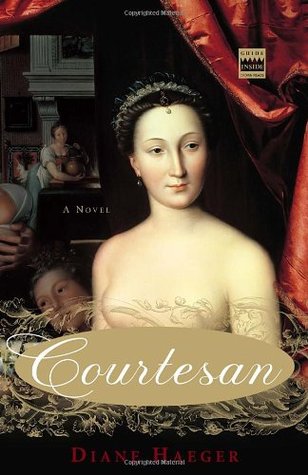Follow my blog!
Wednesday, December 02, 2015
My review of Courtesan by Diane Haeger
About the book:
Amid the disapproving gossip of the Court, a royal romance defies all obstacles.
The Court of François I is full of lust, intrigue, and bawdy bon temps—a different world from the quiet country life Diane de Poitiers led with her elderly husband. Now a widow, the elegant Diane is called back to Court, where the King’s obvious interest marks her as an enemy to the King’s favourite, Anne d’Heilly. The Court is soon electrified by rumors of their confrontations. As Anne calls on her most venomous tricks to drive Diane away, Diane finds an ally in the one member of Court with no allegiance to the King’s mistress: his teenage second son, Henri.
Neglected by his father and disliked by his brothers, Prince Henri expects little from his life. But as his friendship with Diane deepens into infatuation and then a romance that scandalizes the Court, the Prince begins to discover hope for a future with Diane. But fate and his father have other plans for Henri—including a political marriage with Catherine de Medici. Despite daunting obstacles, Henri’s devotion to Diane never wanes; their passion becomes one of the most legendary romances in the history of France.
My review:
Haeger's writing style in Courtesan seemed a bit antiquated, but it worked for the story. The novel read like it had an omniscient point of view, but in reality it was mostly head-hopping. Since this book was first published in 1993, and at the time head hopping was fairly common in novels, I'd say no harm, no foul. Haeger's writing was beautiful, in my opinion. Her descriptions were compelling, which I love, because it's a means for me to escape.
It's not a light read, but it's more of an in-depth look at the emotional conflict of the Courtesan (Diane) and the struggles she had in her life because of her love for Henri, the Kind of France. She'd cared for him as a boy, but he'd loved her as a young man. She was quite a bit older than he was when he'd first kissed her. She resisted for many reasons. One fact in particular really bothered her. He was a teenager and she was a grown woman with two adult daughters at the time their relationship became physical. But she was powerless to resist him due to his sincere, heartfelt love for her.
Henri adored her, but due to her age it wasn't a love affair that was easily accepted. Henri fantasized about making her his wife, but his father set him up for a political marriage that he could not refuse as his father was king. His devotion to Diane continued, but she could never be his queen. He was already married to Catherine de Medici and he resisted her in every way possible. Henri was never intended for the throne, but when his brother died shortly after becoming king (in the wake of King Francois's death), everything changed.
Having read the story of Catherine de Medici's life by C.W. Gortner several years ago, all told from his point of view, I found "Courtesan" even more intriguing since the primary point of view in Haeger's book is Diane de Poitiers, and she was the love rival to Catherine, the queen, who in Gortner's book was the primary point of view.
There were a lot of consistencies in their stories since they had to stick with the historical fact that Catherine gave Henri many heirs, but the stories were told from different perspectives. Haeger's book is a heartbreaking story, really, as Catherine doesn't capture her husband's heart even at the end of her husband's life. I found myself pondering what it would be like to live as Catherine and also to live as Diane. These types of conflicts always intrigue me so it takes me longer to read a book with deep characterization.
I thought about the characters so much while reading each novel. All in all, I enjoyed this book. I liked Gortner's writing style better since it is more contemporary writing with no head-hopping, but Haeger also has a beautiful writing style that I found enjoyable as well. Highly recommended for historical romance lovers.
Courtesan was first published in 1993 and later reprinted in 2006 by Broadway Books.
Subscribe to:
Post Comments (Atom)

No comments:
Post a Comment